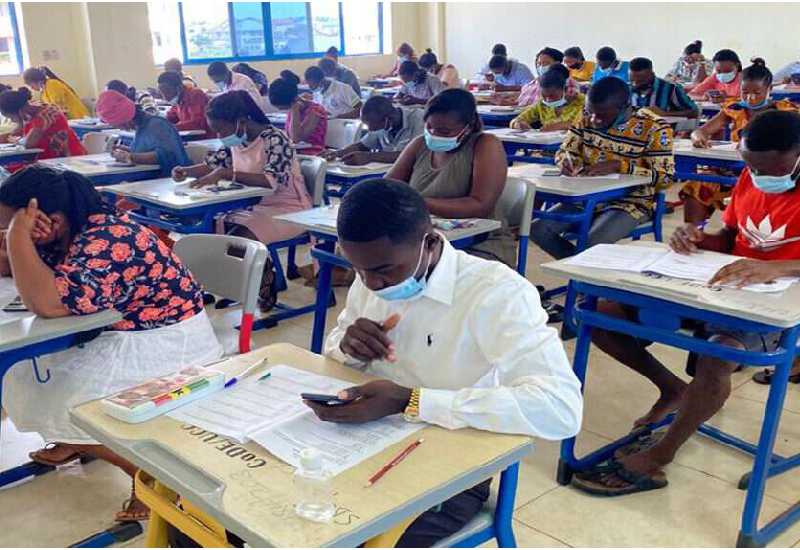With many fearing what the future holds for impressionable children in the classrooms who are made to believe hook, line and sinker whatever a teacher dishes out, without ‘questioning’ the authority, the question in the minds of many is whether there is any redemption for the teaching profession.
Considering the journey of life is a test in itself which many have succeeded at and many more have failed, we have inadvertently been taught not to give up and be tagged a failure for not pursuing hard enough.
This has been the story of most prospective teachers whose ‘diehard’ resilience to make it through the eye of the teacher licensure exam, has yet again led them to fall from such staggering heights.
In the June 2023 release of the Ghana Teacher Licensure Examination results, a staggering 6,481 prospective teachers attempted a resit, unfortunately, only 1,277 managed to pass, accounting for a meagre 16.5 percent success rate. This disheartening outcome raises concerns about the competency of educators who will shape the future generation. Some candidates have even attempted the examination up to nine times, indicating a lack of progress and readiness.
While many have justified the failure of prospective teachers by the reasoning of ‘examination jitters’ and lack of preparation, others reckon the wound is way deeper than it meets the eye – a real foundational matter. Being scored on the basics of every teaching and learning principle of literacy skills, numeracy and essential skills a lot is left to be desired on what students will be taught when the teacher cannot aptly spell organiser or headteacher.
Hitherto, graduates from colleges of education did not require any other external examination to determine their suitability for the classroom. However, a decision was made in 2018 to introduce the Ghana Teacher Licensure Examination (GTLE) with the primary purpose of improving teaching quality.
To achieve this, the responsibility was shouldered by the National Teaching Council (NTC), an institution responsible for the regulation, licensing, and professional development of teachers in the country. Primarily established by the Education Act, 2008 (Act 778) to improve the quality of teaching and learning in Ghana’s educational system, it has proven over the years to sanitize the education system, albeit saddled with many challenges.
History is there to remind us of gains or otherwise made in any venture and the GTLE is no different. Statistically, the first licensure exams took place in September 2018 and covered essential teaching skills, numeracy and literacy skills. With the pass mark being 50%, a total of 28, 757 students sat and saw 21, 287 passes, while 7,432 failed.
A total of 8,442 teachers, representing 30.7 per cent of the 27,455 candidates who sat for the mandatory Licensure Examination (NTLE) in October 2020 failed.
Undoubtedly, the abysmal performance of these prospective teachers who have resat innumerable times has yet again brought to the fore whether the licensure exam should be scrapped, capped to prevent the ‘eternal’ subscription of re-sitters in the system or stiffened more in terms of reforms to sift out the best and suited teachers for students.
Reforming the licensure examination
Opportunity, indeed, must be created for all and sundry to make the most of every situation, but when is enough, really enough?
Dennis Osei Owusu, the Head of Public Affairs at the National Teaching Council (NTC), following the release of the results, expressed his deep dismay at the performance of prospective teachers, branding it as a significant threat to national security. The alarmingly high failure rate is essentially attributed to the candidates’ lack of dedication and their inability to answer basic-level questions, hence the urgent need for broader consultations among stakeholders to address this critical issue.
Recognizing the severity of the problem, the failed candidates who have one last opportunity, have been advised to approach the council with their concerns and seek redress.
Nonetheless, the NTC has implemented stringent reforms, such as instituting a mandatory degree certificate to qualify for the licensure exam and introduction of continuous professional development programs, designed to equip and qualify all teachers with the necessary skills and knowledge to effectively educate learners.
For all intents and purposes, the performance of teachers is indeed a worry to the whole nation but the fact still remains that we need the right calibre of people in classrooms and Ghana cannot afford to compromise on quality. By prioritising ongoing training and development, there is a need to uplift the standards of teaching and ensure that teachers are well-prepared to fulfil their vital roles in classrooms across the nation.
Indeed, there have been concerns about whether the results reflect the quality of teachers in the classrooms or the lack of adequate preparation for the examination. Nonetheless, the need to examine the factors contributing to the massive failure needs to be thoroughly investigated and addressed to avert the ‘massacre’ of students which will invariably signal death and eventually sink the country’s education sector.
Ashantibiz




